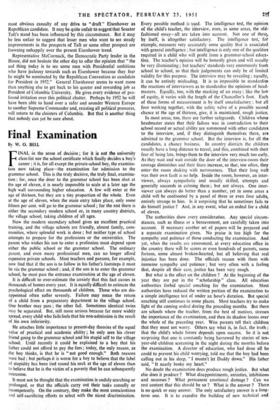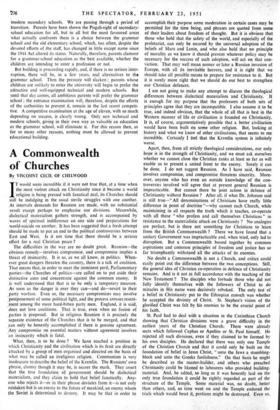Final Examination
By W. 0. BELL
FINAL in the sense of decisive ; for it is not the university class-list nor the school certificate which finally decides a boy's career ; it is, for all except the private-school boy, the examina- tion now taking place—the examination for admission to the grammar school. This is the truly decisive, the truly final, examina- tion ; for, once the door to the grammar school has been shut at the age of eleven, it is nearly impossible to scale at a later age the high wall surrounding higher education. A few will enter at the age of thirteen, but they are a tiny proportion of the whole. Even at the age of eleven, when the main entry takes place, only some fifteen per cent. will go to the grammar school ; for the rest there is either the secondary modern school or, in many country districts, the village school, taking children of all ages.
Now the modern secondary school gives an excellent practical training, and the village schools are friendly, almost family, com- munities, where splendid work is done ; but neither type of school attempts to prepare for the professions or the universities. The parent who wishes his son to enter a profession must depend upon either the public school or the grammar school. The ordinary parent, and even many professional men, can no longer afford expensive private schools. Most teachers and parsons, for example, now find that if the son is to follow in his father's footsteps it must be via the grammar school ; and, if the son is to enter the grammar school, he must pass the entrance examination at the age of eleven.
It is difficult to over-estimate the anxiety that this fact causes in thousands of homes every year. It is equally difficult to estimate the psychological effect on thousands of children. Those who are dis- appointed often suffer severely. Failure may mean the return of a child from a preparatory department to the village school. One brother may pass ; the other fail. Sometimes identical twins may be separated. But, still more serious because far more widely spread, every child who fails feels that his non-admission is the result of his own inferiority.
He attaches little importance to present-day theories of the equal value of practical and academic ability ; he only sees his clever friend going to the grammar school and his stupid self to the village school. Until recently it could be explained to a boy that his father could not afford to pay the fees ; today, the only reason, as the boy thinks, is that he is "not good enough." Both reasons were bad ; but perhaps it is worse for a boy to believe that the label of stupidity has been tied round his neck at the age of eleven than to believe that he is the victim of a poverty that he can subsequently overcome.
It must not be thought that the examination is unduly searching or prolonged, or that the officials carry out their tasks casually or Incompetently. On the contrary, they make the most conscientious and self-sacrificing efforts to select with the nicest discrimination. Every possible method is used. The intelligence test, the opinion of the child's teacher, the interview, even, in some areas, the old- fashioned essay—all are taken into account. Not one of these, by itself, is altogether satisfactory. The intelligence test, for example, measures very accurately some quality that is associated with general intelligence ; but intelligence is only one of the qualities required in a child who will profit from a grammar-school educa- tion. The teacher's opinion will be honestly given and will usually be very illuminating ; but teachers' standards vary enormously front school to school, so that their judgements can only be of limited validity for this purpose. The interview may be revealing ; equally, it can be entirely misleading. It is as impossible to standardise the reactions of interviewers as to standardise the opinions of head- masters. Equally, too, with the marking of an essay ; like the law of equity, it varies with the length of the Chancellor's foot. Each of these forms of measurement is by itself unsatisfactory ; but all four working together, with the safety valve of a possible second chance at the age of thirteen, give, it is maintained, rough justice.
In most areas, too, there are further safeguards. Children whose headmaster states that their failure was in contradiction to their school record or actual ability are summoned with other candidates to the interview, and, if they distinguish themselves there, are admitted to the grammar school. But the interview is. for all the candidates, a chancy business. In country districts the children usually have a long distance to travel, and this, combined with their fear of being late, brings them to the interview very much too early. As they wait and wait outside the door of the interview-room their courage diminishes and their fears increase, so that, too often, they enter- the room shaking with nervousness. That their long wait was their own fault is no help. Inside the room, however, an inter- viewer, always sympathetic and usually skilled, attempts and generally succeeds in calming them ; but not always. One inter- viewer can always do better than a number, yet in some areas a child will be confronted by a panel of three or even four adults, entirely strange to him. Is it surprising that he sometimes fails to do himself justice ? And, in any event, what an ordeal for a child of eleven.
The authorities show every consideration. Any special circum- stances, such as illness or a bereavement, arc carefully taken into account. If necessary another set of papers will be prepared and a separate examination given. No praise is too high for the sympathy and patience of those conducting the examination. And yet, when the results are announced, at every education office in the country there will be scores or even hundreds of parents, some furious, some almost broken-hearted, but all believing that real injustice has been done. The officials reason with them with immense sympathy and patience ; but very often with a feeling that, despite all their care, justice has been very rough.
But what is the effect on the children ? At the beginning of the year they are put in the " scholarship" class. All education authorities forbid special coaching for the examination. Most authorities have reduced the written portion of the examination to a simple intelligence test of under an hour's duration. But special coaching still continues in some places. Most teachers try to make light of the coming ordeal during the preceding months. But there are schools where the teacher, from the best of motives, stresses the importance of the examination, and then its shadow looms over the whole of the preceding year. Wise parents tell their children that they must not worry. Others say what is, in fact, the truth ; that the child's whole future depends upon success. So it is not surprising that one is constantly being harrowed by stories of ten- year-old children screaming in the night during the months before the examination. A director of education, who had done all he could to prevent his child worrying, told me that the boy had been calling out in his sleep, " I mustn't let Daddy down." His father said, " It nearly broke my heart."
No doubt the examination does produce rough justice. But what else does it produce ? What disappointments, anxieties, inhibitions and neuroses ? What permanent emotional damage ? Can we rest content that this should be so ? What is the answer ? There is no quick or easy answer. The only satisfactory answer is a long- term one. It is to expedite the building of new technical and modern secondary schools. We are passing through a period of transition. Parents have been shown the Pisgah-sight of secondary- school education for all, but in all but the most favoured areas what actually confronts them is a choice between the grammar school and the old elementary school, which, too often, despite the devoted efforts of the staff, has changed in little except name since the 1944 Act altered its status. Naturally, therefore, parents clamour for a grammar-school education as the best available, whether the children are intending to enter a profession or not.
But building is proceeding rapidly, and, if there is no serious inter- ruption, there will be, in a few years, real alternatives to the grammar school. Then the pressure will slacken ; parents whose children are unlikely to enter the uhivcrsity will begin to prefer the attractive and well-equipped technical and modern schools. But until that day comes, all ambitious parents will prefer the grammar school ; the entrance examination will, therefore, despite the efforts of the authorities to prevent it, remain in the last resort competi- tive. A competitive examination at the age of eleven, with so much depending on success, is clearly wrong. Only new technical and modern schools, giving in their own way as valuable an education as the grammar school, will eliminate it. For this reason then, as for so many other reasons, nothing must be allowed to prevent educational building.







































 Previous page
Previous page